Both Toyger and Viverral are originated from United States. Both Toyger and Viverral are having almost same weight. Both Toyger and Viverral has same life span. Both Toyger and Viverral has same litter size. Toyger requires Moderate Maintenance. But Viverral requires Low Maintenance
Basic Information
undefined
United States
United States
Life Span:
10 - 15 Years
10 - 15 Years
Colors Available:
brown, fawn, Orange, cream, black
Cream, black, tan - spots
Coat:
Short and smooth
Short and plush
Temperament:
Affectionate, Alert, Cheerful, Curious, Energetic, Friendly, Independent, Intelligent, Lively, Loving, Loyal, Outgoing, Playful, Responsive, Social, Territorial
Affectionate, Aggressive, Alert, Cheerful, Curious, Energetic, Friendly, Independent, Intelligent, Lively, Loving, Loyal, Outgoing, Playful, Responsive, Social, Stubborn, Territorial
Grooming:
Moderate Maintenance
Low Maintenance
New Owners Friendly:
Yes
Yes
History
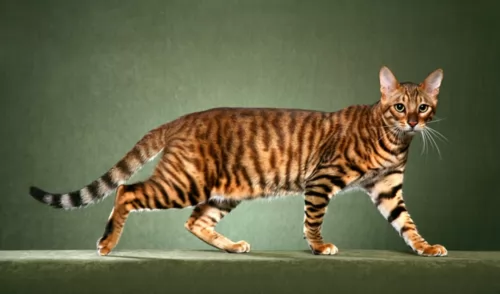 The Toyger is a domestic cat developed from breeding Shorthaired Tabbies to look like a small Tiger.
The Toyger is a domestic cat developed from breeding Shorthaired Tabbies to look like a small Tiger.
It has the striped coat of the Tiger. The person to develop the Toyger is Judy Sugden.
The unusual-looking cat has been recognized for registration by the International Cat Association in the 1990s. It was accepted as a full championship breed in 2007.
Today this designer cat is recognized by the ICA but not the Cat Fancier's Association.
This is a rare cat breed and therefore not much information on it is available.
It does seem that in 2002, a 5th generation Viverral was developed and this established the breed.
The cat is described as a fishing cat hybrid. A breeding program was started but it is thought that the cat became extinct.
Description
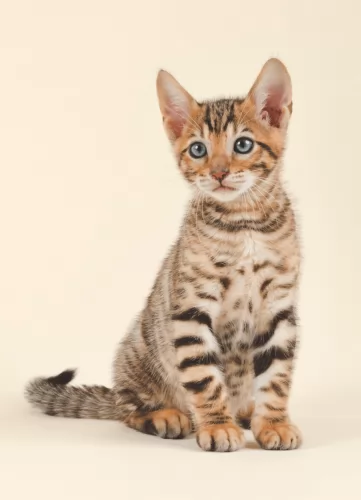 The Toyger is a medium to large-sized cat that can weigh between 5 and 9kg. As with any cat, with these newer kinds of cats, the size of the cat can vary.
The Toyger is a medium to large-sized cat that can weigh between 5 and 9kg. As with any cat, with these newer kinds of cats, the size of the cat can vary.
It is a shorthair cat that is quite a bit bigger than your regular cat. The coat of this mixed breed cat has markings similar to that of a tiger - vertical orange striping with rosettes.
The coat of the cat is short and he is a brown mackerel tabby with stripes being a dark brown to black. The eyes of the cat can be a blue, aquamarine, green, or gold.
Temperament:
These cats have a laid back disposition, and will comfortably slot into a busy household.
They are playful and intelligent and can be taught tricks and to walk on the lead.
This cat enjoys the company of people and will get on well with other pets too. People who have owned them say they are the most affectionate and loving cats there are and will enjoy being petted and pampered by their human family.
They get on well in busy households where there are children and other pets. They’re super smart and can be trained with ease.
Unlike many other cat breeds, he seems to also enjoy playing in water.
The Viverral is muscular and substantial. He has a smallish head and smallish ears with a thick tail.
The coat is spotted. The base color of the coat and the spots should be different. The light cream underbelly is also spotted.
Large, muscular, and solid, the cat’s eyes are big and round in the smallish heald. The coat is short and plush with a spotted pattern of black, brown or tan spots.
Temperament:
The Viverral cat has been designed to produce friendly kittens that are curious and confident. They turn out strong and confident and are suitable as house cats.
New cat owners might have success with them and they can even be friendly with children in the home, but the truth remains, they are unpredictable.
Beautiful and something unique, it is not likely though that this cat breed would have wanted to be cuddled and petted by his human owners.
Characteristics
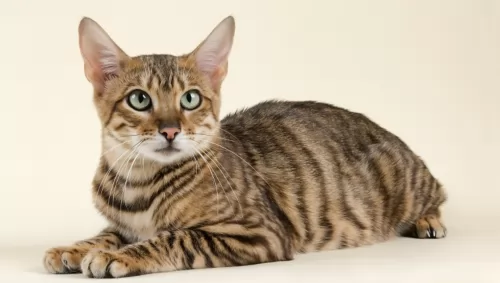 Toygers are expensive cats and there aren’t many breeders in the world. If you do decide to invest in a Toyger, he will need careful looking after, after all, you've spent a lot of money on him.
Toygers are expensive cats and there aren’t many breeders in the world. If you do decide to invest in a Toyger, he will need careful looking after, after all, you've spent a lot of money on him.
Diet is of absolute importance to keep such a cat healthy. The right environment is also important as cats and dogs for that matter too, can become ill and depressed if they find themselves in homes where they are unloved and abused.
Don't get a cat if you aren't prepared to love and care for him. Because the question is then 'why get a cat?'
Hybrid cats such as the Viverral can look quite a bit like a wild cat and this is what first appeals to cat lovers. They want an exotic cat to brag about.
However, these cats can come up with a whole lot of behavioral problems so that you wish you had never got one. One should just go along to some of the many cat shelters there are to discover how many hybrid cats land up there.
They turned out to be a disappointment – their behavior wouldn’t conform to what their human family expected of them. This is the story of hybrid cats. Humans want some exotic looking animal to please their greedy natures and then when the cats don’t behave the way they should, they get rid of them. Rather, it is humans that need to change their behavior and leave wild animals alone.
The Viverral can have their good side and be splendid pets but they aren’t consistent. They have a streak of unpredictability, and they also have issues with the use of a litter box.
They mark their territory too and can show some aggression. Any animal with a wild side isn’t going to make the best pet, but still, some cat lovers have managed to bring out their best side.
Health Problems
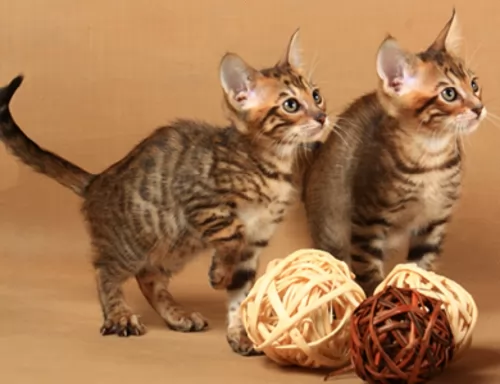 Just like in human beings, obesity can reduce the lifespan of your cat. Make sure you keep your Toyger’s weight under control.
Just like in human beings, obesity can reduce the lifespan of your cat. Make sure you keep your Toyger’s weight under control.
These cats are considered to be fairly healthy. He can be predisposed to some of the same cat conditions that the Bengal and Domestic Shorthair face.
When your Toyger shows any signs of illness, get him to the vet. Some of the common health problems your Toygers might have to contend with include obesity and heart murmurs.
A heart murmur is an abnormal heart sound, and is caused by turbulent blood flow within the heart. When you vet examines your cat, a heart murmur is detected when the vet listens to your cat's heart with a stethoscope. The vet will discuss with you the way forward for your cat.
If you get a Toyger kitten, you will have to make sure he is up to date with his vaccinations. This is part of being a responsible cat owner.
The breeder will have a record of his vaccinations and will hand this over to you.
At 6 – 8 weeks kittens start with their first injections which include vaccinations for distemper, feline rhinotracheitis, and feline calici virus.
The development of hybrid cats began as a scientific effort in the 1970s. Hybrid pets can be aggressive and also solitary.
Hybrid cats are an unnatural breeding. They are cat species that weren’t meant to mate in the first place. Breeders tell stories of premature births and also aborted pregnancies.
Some of the more common illnesses among hybrid cats include digestive issues. Also, vaccinations used to protect our domestic cats from disease have not been approved for use in hybrid animals.
A hybrid cat has a wild side to him. These cats were bred to look like a wild cat, and although they are healthy, they can also have some health issues.
Ensuring the cat has a proper diet will contribute more to better health. As mentioned, some of these cats can battle with the likes of chronic diarrhea and irritable bowel disease and also battle with intestinal parasite issues.
Caring The Pet
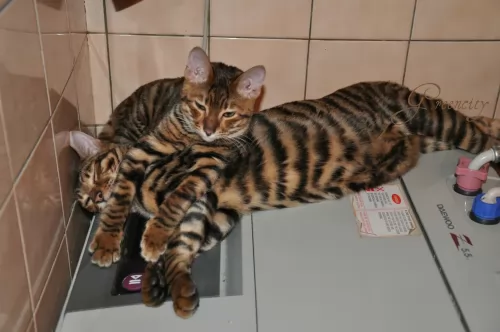 Toygers should be brushed weekly and have their nails trimmed regularly. As with all domesticated cats, you should check inside his ears to make sure they don’t become clogged with dirt and wax.
Toygers should be brushed weekly and have their nails trimmed regularly. As with all domesticated cats, you should check inside his ears to make sure they don’t become clogged with dirt and wax.
These are smart cats so they will need to be provided with attention in the form of clever games and toys that get him thinking.
Toygers need to be fed much like any other domestic cat. The most important thing to remember when feeding a cat is that they are carnivores and they require meaty food high in protein.
Speak to your vet about the absolute necessity of getting your cat’s diet right. For your convenience, cat food manufacturers have brought out many excellent cat foods that cater to the time of life your cat is in.
Make sure your Toyger has a constant supply of fresh, cool water.
These are different cats to your regular domestic cat, and they will require different care. One of the things you need to do for a cat like this is provide it with an outdoor enclosure.
Because of their wild side, they are longing to be outdoors and you may find it difficult integrating such a cat into your home.
The Viverral needs plenty of exercise but you can’t just let them roam freely outdoors. Yes, you can train them to walk with a leash but you need to allow him outside in the enclosure. You can include a shallow paddling pool for him too.
These are active, intelligent cats and you will need to invest in some interactive toys for him to keep him amused.
You will need to supply this cat with a scratching post and a climbing tree. This is because as a cat, he is a natural climber and scratcher and he will need these in his life.
Ensure your feline pet has a nice warm, dry place to sleep.
Comparison with other breeds
- Viverral vs Abyssinian - Breed Comparison
- Viverral vs Aegean - Breed Comparison
- Viverral vs African Serval - Breed Comparison
- Viverral vs Chausie - Breed Comparison
- Viverral vs American Bobtail - Breed Comparison
- Viverral vs American Curl - Breed Comparison
- Viverral vs American Keuda - Breed Comparison
- Viverral vs American Longhair - Breed Comparison
- Viverral vs American Polydactyl - Breed Comparison
- Viverral vs American Shorthair - Breed Comparison
- Viverral vs American Wirehair - Breed Comparison
- Viverral vs Applehead Siamese - Breed Comparison
- Viverral vs Ashera - Breed Comparison
- Viverral vs Asian - Breed Comparison
- Viverral vs Asian Semi-Longhair - Breed Comparison
- Viverral vs Australian Mist - Breed Comparison
- Viverral vs Balinese - Breed Comparison
- Viverral vs Bengal - Breed Comparison
- Viverral vs Bicolor - Breed Comparison
- Viverral vs Birman - Breed Comparison
- Viverral vs Blue Russian - Breed Comparison
- Viverral vs Bombay - Breed Comparison
- Viverral vs Brazilian Shorthair - Breed Comparison
- Viverral vs Bristol - Breed Comparison
- Viverral vs British Longhair - Breed Comparison
- Toyger vs Abyssinian - Breed Comparison
- Toyger vs Aegean - Breed Comparison
- Toyger vs African Serval - Breed Comparison
- Toyger vs Chausie - Breed Comparison
- Toyger vs American Bobtail - Breed Comparison
- Toyger vs American Curl - Breed Comparison
- Toyger vs American Keuda - Breed Comparison
- Toyger vs American Longhair - Breed Comparison
- Toyger vs American Polydactyl - Breed Comparison
- Toyger vs American Shorthair - Breed Comparison
- Toyger vs American Wirehair - Breed Comparison
- Toyger vs Applehead Siamese - Breed Comparison
- Toyger vs Ashera - Breed Comparison
- Toyger vs Asian - Breed Comparison
- Toyger vs Asian Semi-Longhair - Breed Comparison
- Toyger vs Australian Mist - Breed Comparison
- Toyger vs Balinese - Breed Comparison
- Toyger vs Bengal - Breed Comparison
- Toyger vs Bicolor - Breed Comparison
- Toyger vs Birman - Breed Comparison
- Toyger vs Blue Russian - Breed Comparison
- Toyger vs Bombay - Breed Comparison
- Toyger vs Brazilian Shorthair - Breed Comparison
- Toyger vs Bristol - Breed Comparison
- Toyger vs British Longhair - Breed Comparison
 Petzlover
Petzlover The Toyger is a domestic cat developed from breeding Shorthaired Tabbies to look like a small Tiger.
The Toyger is a domestic cat developed from breeding Shorthaired Tabbies to look like a small Tiger. The Toyger is a medium to large-sized cat that can weigh between 5 and 9kg. As with any cat, with these newer kinds of cats, the size of the cat can vary.
The Toyger is a medium to large-sized cat that can weigh between 5 and 9kg. As with any cat, with these newer kinds of cats, the size of the cat can vary. Toygers are expensive cats and there aren’t many breeders in the world. If you do decide to invest in a Toyger, he will need careful looking after, after all, you've spent a lot of money on him.
Toygers are expensive cats and there aren’t many breeders in the world. If you do decide to invest in a Toyger, he will need careful looking after, after all, you've spent a lot of money on him. Just like in human beings, obesity can reduce the lifespan of your cat. Make sure you keep your Toyger’s weight under control.
Just like in human beings, obesity can reduce the lifespan of your cat. Make sure you keep your Toyger’s weight under control. Toygers should be brushed weekly and have their nails trimmed regularly. As with all domesticated cats, you should check inside his ears to make sure they don’t become clogged with dirt and wax.
Toygers should be brushed weekly and have their nails trimmed regularly. As with all domesticated cats, you should check inside his ears to make sure they don’t become clogged with dirt and wax.